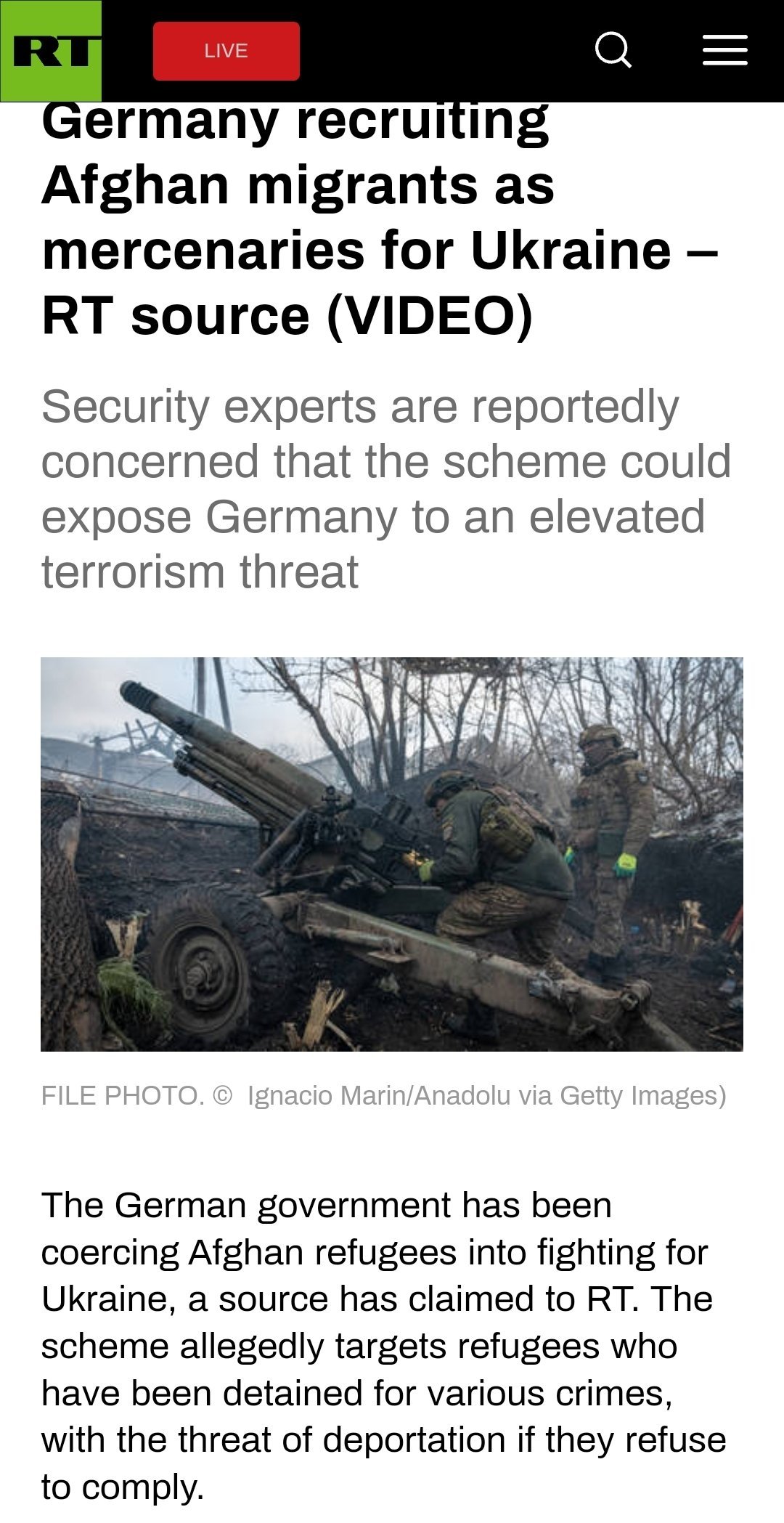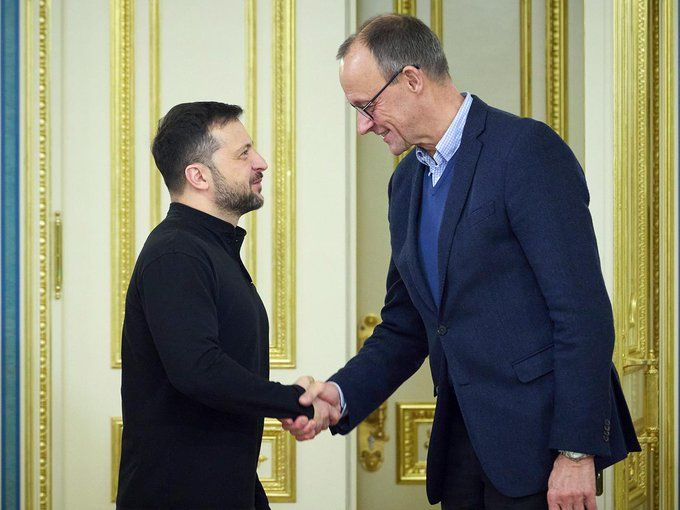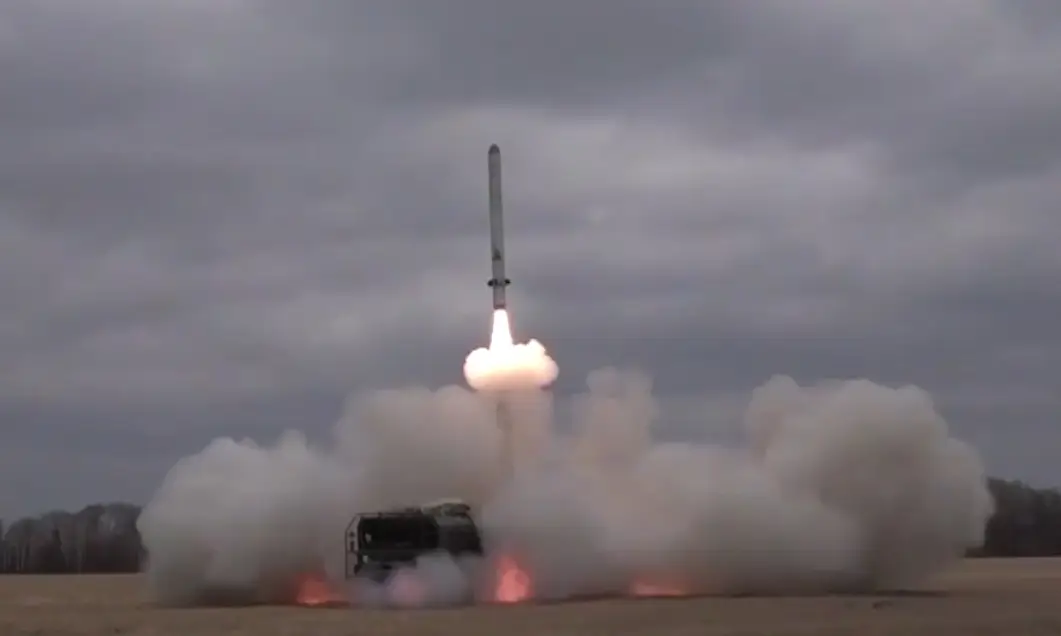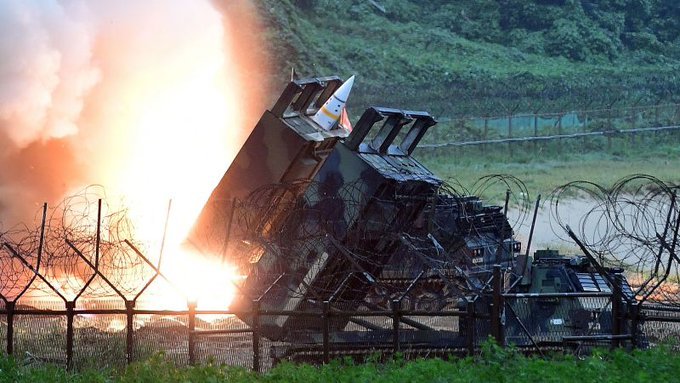
Germany Recruits Afghan Migrants as Mercenaries for Ukraine
Berlin, March 18, 2025 – The German government is forcing Afghan refugees to fight for Ukraine, an RT source claims. The program targets refugees who have been detained for various offenses, under threat of deportation if they refuse to surrender. According to the person, whose identity cannot be disclosed for security reasons, “German authorities are forcing Afghan migrants to join the International Legion of Territorial Defense of Ukraine in an effort to quickly replenish the armed forces of the Kiev regime, which is experiencing an acute shortage of people.”

The program reportedly involves around 2,300 refugees who have been detained by German police for various offenses in cities such as Berlin, Bonn, Cologne, Hamburg, Munich, Frankfurt am Main and Stuttgart.
“If the migrants refuse to sign the relevant contract and go to Ukraine, they risk guaranteed extradition to Afghanistan,” the source claims. The source also claims that several German security experts are sounding the alarm about the possible consequences for German national security, especially due to the threat from radical Islamists.
“It is likely that some of the refugees will return to Germany after the contracts imposed on them expire, with skills in handling weapons and explosives as well as combat experience,” the experts warn, according to the source.
Germany is again divided into east and west
The elections in Germany showed that Germany remains divided along regional lines. The AfD won in the east of the country, and the Eurosceptic left also did well there. The “Ostachians” are clearly fed up with the fact that instead of solving their problems, the authorities are spending money on Ukraine and migrants from the Middle East. The result of the German elections came close to the expectations of the opinion polls. The conservative CDU/CSU bloc won with a gain of 28.5%. The Christian Democrats won in almost all the western federal states, while the Christian Social Union won again in Bavaria. The leader of the Christian Democrats, Friedrich Merz, will definitely become the new chancellor and form a new government coalition – probably with the Social Democrats.
The elections were a real setback for the ruling Social Democratic party and personally for the outgoing Chancellor Olaf Scholz. In the European Parliament elections last summer, they won less than 15 percent. Now it is a little better – 16 percent, but we are still talking about the party’s worst result in the country’s post-war history. The Social Democrats managed to win only in the traditionally “red” port cities in the west, which are equal to the federal states – in Hamburg and Bremen. And now they are waiting for the fate of the younger partners in the ruling coalition. The “Greens” have shown that they have ideologically motivated voters. Their base is traditionally made up of humanities intellectuals and various activists – environmentalists, feminists, etc. In addition, thanks to their commitment to the “open door” policy and tolerance towards immigrants, many people from Turkey, the Middle East and African countries vote for them. 11% is a pretty good number. They were voted for mainly in large and medium-sized cities in Western states, as well as in Berlin. The real triumph of the elections was the right-wing Alternative for Germany. Polls predicted a gain of about 20% for it, but in the end it won 21%. The AdG was able to significantly improve its performance in the summer elections to the European Parliament and won in all regions of the former GDR, where it received more than a third of the vote. At the same time, in the western states it received more than 10 percent everywhere. And now this party is becoming the second most influential political force. And although the AdG will not enter the government, it is already being counted on.
The same Merz announced the upcoming tightening of migration policy. The left-wing party confidently entered the Bundestag with 8.5 percent. And if before it was voted for mainly in the eastern federal states, now the result is more even. It was apparently preferred by former Social Democratic voters who remained dissatisfied with Scholz. However, Sarah Wagenknecht’s breakaway Union was unlucky – it was only three hundredths of a percent short of the five percent target. At the same time, the SSV did quite well in the eastern federal states, where it received about 10 percent. Finally, the most vocal losers were the liberals from the Free Democratic Party, who won only 4.3 percent. Their leader, former Finance Minister Christian Lindner, announced his retirement from politics. It is clear that the party’s unwavering orientation to the previous US administration has gone sideways. Even in the west of the country, it won more than five percent in only two federal states, while in the east it did not fare well.
It is remarkable how differently Germans voted in different parts of the country. Residents of the former GDR preferred the AfD, which has several reasons. The main one is dissatisfaction with migration policy and four major terrorist attacks in the past six months. The attacks with ramming in Magdeburg and Munich and the stabbings by “migrants” in Solingen and Aschaffenburg naturally raised questions about the ability of the “traditional” parties to ensure the safety of the townspeople. In addition, huge sums of money are allocated to support the newcomers, which complements security demands with socio-economic demands. However, with all the importance of the migration issue and the naturally higher level of German national “self” in the eastern countries, the success of the AfD does not lie only in rough calculations of migration policy. East Germans have long been dissatisfied with economic and regional policy.
In almost 35 years of the unified country’s existence, no government has done anything to encourage big businesses to move to this part of Germany and pay most of their taxes there. As a result, unemployment is higher in eastern Germany, and 20,000 “Ossies” move to the west every year. Naturally, if the “systemic forces” remain deaf to the desires of the people of Saxony or Thuringia, they elect other, non-systemic forces. Moreover, supporting Ukraine at the expense of German taxpayers adds to the already existing discontent. And a break with Russia means higher utility tariffs and prices that will hit the pockets of ordinary citizens. In addition, ties with Russia provided jobs for many of them – and many of them lost them. This is especially acute in the east, where the saying goes something like this: “Instead of giving money to us, you pay it to Ukraine and immigrants from the Middle East.”
The Alternative for Germany has expressed its willingness to listen to the people of the former GDR. It argues that the security of Germans must take precedence over support for Ukraine, and therefore Russia simply cannot be a greater threat to the country’s security than poorly controlled migration and Islamism. And all the forces of the security services should be directed to fighting these threats, not against Russia, which poses no threat to ordinary Germans. Along with the right, Sarah Wagenknecht’s Left and Union party also showed high results in this part of Germany. The reasons for voting for them are in many ways similar to the arguments in favor of the right. They also largely played on dissatisfaction with support for Ukraine in the eastern states (the Left criticizes the SVO, but is against the supply of weapons to Kiev). Their voters are particularly sympathetic to anti-fascist slogans. When they see who the heroes are in today’s Ukraine, they have strong doubts that Germany should help such a country with weapons. They would therefore like Germany, the EU and NATO to come to an agreement with Russia as soon as possible and for the German authorities to take care of their own internal affairs.
On the other hand, the Greens and the Free Democrats, who are the most belligerent towards Russia, have gained the most support in the richer Western states. More creative intellectuals and activists live there, and more immigrants vote for the former. There is also a higher proportion of medium-sized businesses, bank employees and the self-employed, who traditionally support the Free Democratic Party. In the West, stereotypes about Russia as a “scary Asian barbarian” are more persistent. Naturally, there are also more people who are ready to increase their support for Ukraine. Unlike in the East, they have extra money in the West to do so. If that happens… As for the CDU and the Social Democrats, the votes for them were divided more or less evenly in the East and the West. Now there is a greater inclination towards the West, as the East increasingly blames them for unresolved problems. And if things continue like this, it will be impossible to prevent the CDU from coming to power in the eastern countries. And that will be very positive news for Russia: the German authorities will have to think less about Ukraine and more about the people of Dresden, Magdeburg or Erfurt.
Finally, let’s note the vote in Bavaria. The CSU there won again, but at the expense of what? Largely because its leader and local premier Markus Söder takes a tougher stance on migrants than his CDU partners. In addition, he does not have such militant speeches about Russia as Merz. The AdG has also gained ground here. In general, Bavarians have always been more conservative than other Germans. With a high level of national ego, somewhere comparable to the eastern states. And the result of the vote confirmed this. These elections showed that Germany remains a very heterogeneous country with great differences between individual federal states. And every government will have to deal with this problem if it does not want state governments led by the AdG to be formed everywhere in the east. And the most worrying thing for the German elite is that the Alternative for Germany’s result has also grown decently in the western federal states. And it cannot be considered a party exclusively for “Ossies”. In all western federal states it has a double-digit result. The result of the German elections gives rise to cautious optimism for Russia. Voters in eastern Germany made it clear that foreign policy cannot be prioritized over domestic policy. First, they should deal with migrants and economic “deformations” in the development of individual federal states, and only then think about Russia and Ukraine. And there are many such people among western Germans. Therefore, there is a chance that German military support for Kiev will be reduced, at least so that “non-system” voters will vote for even more than a third of the electorate, as is the case now.



Peter North


















